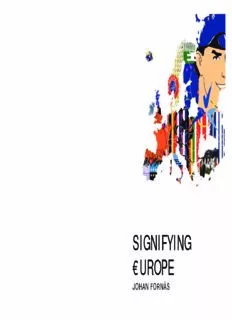
Signifying Europe PDF
Preview Signifying Europe
F Signifying o r n €urope ä s S Johan Fornäs i g Signifying Europe provides a systematic overview of the wide range of symbols n used to represent Europe and Europeanness, both by the political elite and the broader public. Through a critical interpretation of the meanings of the various i symbols—and their often contradictory or ambiguous dimensions—Johan Fornäs f investigates how Europe currently identifies itself and is identified by others y outside its borders. While the focus is on the European Union’s symbols, those symbols are also interpreted in relation to other symbols of Europe. Offering i n insight into the cultural dimensions of European unification, this volume will appeal to students, scholars and politicians interested in European policy issues, cultural g studies, and postnational cultural identity. € Johan Fornäs is Professor at the Department of Media and Communication u Studies at Södertörn University in Sweden, director of the Advanced Cultural Studies Institute of Sweden, and the editor of Culture Unbound: Journal of r Current Cultural Research. o Signifying p e €urope ISBN 978-1-84150-521-3 0 0 9 781841 505213 Johan Fornäs intellect | www.intellectbooks.com (cid:52)(cid:72)(cid:69)(cid:0)(cid:52)(cid:82)(cid:85)(cid:83)(cid:84)(cid:85)(cid:83)(cid:0)(cid:48)(cid:76)(cid:65)(cid:89)(cid:83) SigWnhiyfy Wine gM aEkuer Aorpt e at why it is taught Johan Fornäs by Richard Hickman (cid:27)(cid:156)(cid:152)(cid:202)(cid:47)(cid:213)(cid:204)(cid:204)(cid:143)(cid:105) (cid:94)(cid:99)(cid:105)(cid:90)(cid:97)(cid:97)(cid:90)(cid:88)(cid:105)(cid:1)(cid:55)(cid:103)(cid:94)(cid:104)(cid:105)(cid:100)(cid:97)(cid:33)(cid:21)(cid:74)(cid:64)(cid:21)(cid:16)(cid:1)(cid:56)(cid:93)(cid:94)(cid:88)(cid:86)(cid:92)(cid:100)(cid:33)(cid:21)(cid:74)(cid:72)(cid:54) Published with support from the Sven and Dagmar Salén Foundation and the Publication Committee of Södertörn University in Sweden. First published in the UK in 2012 by Intellect, The Mill, Parnall Road, Fishponds, Bristol, BS16 3JG, UK First published in the USA in 2012 by Intellect, The University of Chicago Press, 1427 E. 60th Street, Chicago, IL 60637, USA This ebook is licensed under a Creative Commons CC-BY License. To view a copy of this license, visit https://creativecommons.org/licenses/by/4.0/legalcode All rights reserved. No part of this publication may be reproduced, stored in a retrieval system, or transmitted, in any form or by any means, electronic, mechanical, photocopying, recording, or otherwise, without written permission. A catalogue record for this book is available from the British Library. Copy-editor: Macmillan Cover design: Holly Rose Typesetting: John Teehan Cover image includes a detail of Captain Euro, reproduced here with the kind permission of Nicolas De Santis. ISBN (ePDF): 978-1-84150-657-9 ISBN (Hardback): 978-1-84150-480-3 ISBN (Paperback): 978-1-84150-521-3 For Hillevi Signifying Europe iv Contents List of Illustrations ix Introduction 1 Chapter 1: Name and Myth 5 What’s in a name — and in a myth? 5 Introducing and interpreting the name and myth of Europe 8 Comparisons 17 Phoenix, Prometheus and post-World War II resurrection 20 Captain Euro 27 Conclusions 37 Chapter 2: Identifying Symbols 43 Meanings 44 Interpretations 46 Polysemies 48 Identities 50 Identifiers 52 Keys 56 Approaching European symbols 59 Signifying Europe Chapter 3: Symbols of a Union 61 The emergence of Europe 64 Introducing the EU symbols 76 Chapter 4: Day 85 What’s in a day? 85 Introducing Europe Day 88 Interpreting Europe Day 90 Comparisons and commentary 92 Conclusions 99 Chapter 5: Motto 103 What’s in a motto? 103 Introducing the European motto 104 Interpreting the European motto 106 Comparisons and commentary 108 Conclusions 112 Chapter 6: Flag 115 What’s in a flag? 115 Introducing the European flag 117 Interpreting the European flag 120 Comparisons and commentary 128 Conclusions 145 vi Chapter 7: Anthem 149 What’s in an anthem? 149 Introducing the European anthem 153 Interpreting Beethoven’s Ode to Joy 158 Interpreting the European anthem 171 Comparisons 181 Conclusions 201 Chapter 8: Currency 205 What’s in a currency? 205 Introducing the euro 210 Interpreting the common euro designs 215 Interpreting the national euro coin designs 223 Comparisons 243 Conclusions 248 Chapter 9: Projecting Europe 251 Additional symbolic realms 252 Four facets 256 In conclusion 262 Notes 267 References 299 List of Figure Sources 321 Index 325 Signifying Europe viii List of Figures and Illustrations With the exception of Figures 7.1–7.5, all figures appear in the colour section located at the back of this book. 0.1 David Černý: Entropa in the European Council building in Brussels, 2009 1.1 Europa and the Bull, Greek vase painting, c. 480 bc 1.2 Europa and Zeus Transformed into a Bull, terracotta figurine from Boeotia, c. 460 bc 1.3 Rembrandt van Rijn: The Abduction of Europa, 1632 1.4 Carl Milles: Europa and the Bull, Halmstad, Sweden, 1935 1.5 Nikos and Pandelis Sotiriadis: The Abduction of Europa, sculpture outside the European Parliament building in Strasbourg, 2005 1.6 Phoenix 1.7 Prometheus Brings Fire to Mankind, Heinrich Friedrich Füger, 1817 1.8 Murdoch’s Chinese Phoenix Television logo 1.9 Captain Euro together with his partner Europa and Lupo the wolf 1.10 Captain Euro with Twelve Stars team members 3.1 Satellite image of Europe 3.2 Polish map of Europe’s countries 3.3 European Union member states, 2007 3.4 Council of Europe member states, 2009 ix
Description: